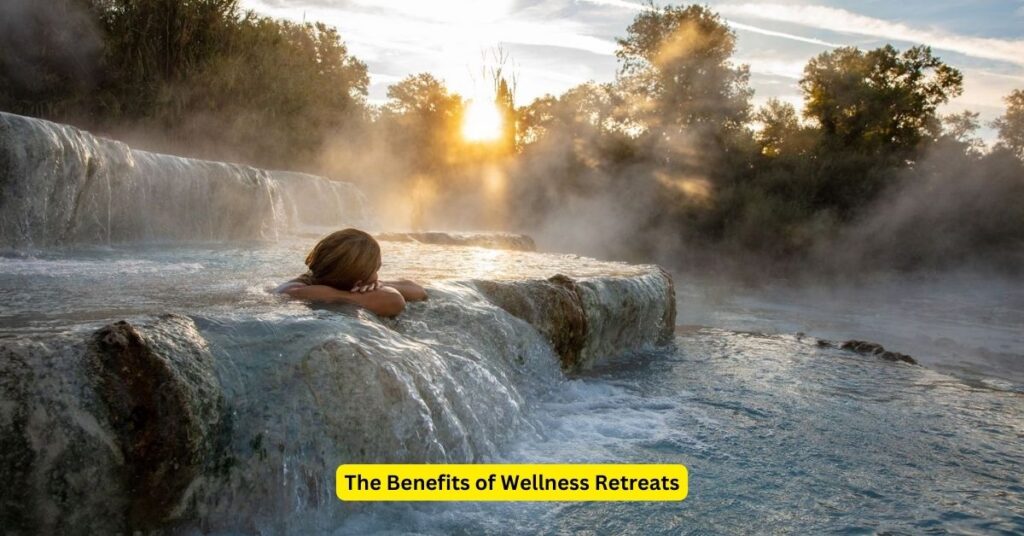In today’s fast-paced society, where stress and burnout are prevalent, the concept of wellness retreats has emerged as a beacon of hope for those seeking refuge from the demands of everyday life. A wellness retreat is essentially a structured getaway designed to provide individuals with a holistic approach to health and well-being.
These retreats typically take place in serene and picturesque locations, offering participants a chance to disconnect from the noise of the modern world and focus on self-care and rejuvenation.
The allure of wellness retreats lies in their ability to provide a comprehensive experience that addresses the physical, mental, and emotional aspects of health. Participants are encouraged to engage in activities such as yoga, meditation, nature walks, and spa treatments, all of which are aimed at promoting relaxation, stress reduction, and overall wellness.
Moreover, wellness retreats often emphasize the importance of mindfulness and self-awareness, encouraging participants to cultivate a deeper connection with themselves and their surroundings.
Wellness retreats come in various forms, catering to a diverse range of interests and preferences. Whether you’re drawn to the tranquility of a yoga retreat, the adventure of an outdoor expedition, or the detoxifying effects of a wellness cleanse, there’s a retreat out there to suit your needs.
In the following sections, we’ll delve deeper into the different types of wellness retreats available and explore the multitude of benefits they offer for both body and mind.
Understanding Wellness Retreats

To truly grasp the essence of wellness retreats, it’s essential to understand their core components and objectives. At its heart, a wellness retreat is more than just a vacation; it’s a transformative experience aimed at nurturing the mind, body, and spirit.
These retreats typically span several days to weeks, allowing participants ample time to immerse themselves in a supportive and nurturing environment conducive to personal growth and self-discovery.
One of the defining features of wellness retreats is their focus on holistic health and well-being. Rather than simply addressing physical ailments or symptoms, these retreats take a comprehensive approach that encompasses all aspects of wellness, including mental, emotional, and spiritual health.
Participants are encouraged to explore various practices and modalities, from yoga and meditation to nutrition and mindfulness, to cultivate a balanced and sustainable lifestyle.
Types of Wellness Retreats:
- Yoga Retreats: These retreats focus on yoga practice, meditation, and mindfulness techniques to promote physical strength, flexibility, and mental clarity.
- Meditation Retreats: Centered around mindfulness and introspection, meditation retreats offer participants the opportunity to cultivate inner peace and emotional balance.
- Detox Retreats: These retreats focus on cleansing the body of toxins through specialized diets, fasting, and holistic therapies, aiming to improve overall health and vitality.
- Adventure Retreats: Ideal for thrill-seekers, adventure retreats combine physical activities such as hiking, kayaking, and rock climbing with mindfulness practices to promote a sense of adventure and well-being.
Key Components of Wellness Retreats:
- Expert Guidance: Experienced instructors and practitioners lead sessions, providing guidance and support throughout the retreat.
- Holistic Approach: Wellness retreats often integrate various holistic practices, including yoga, meditation, nutrition, and spa treatments, to address the mind, body, and spirit.
- Immersion in Nature: Many retreats are held in natural settings such as mountains, forests, or beachfronts, allowing participants to reconnect with nature and experience its therapeutic benefits.
Another key aspect of wellness retreats is their emphasis on community and connection. Participants often come together from diverse backgrounds and walks of life, united by a common desire to prioritize their health and well-being. This sense of camaraderie and support can be incredibly empowering, providing individuals with the encouragement and motivation they need to embark on their wellness journey.
In essence, wellness retreats offer a unique opportunity to press pause on the chaos of everyday life and invest in oneself. By stepping outside of their comfort zones and embracing new experiences, participants can gain valuable insights, cultivate healthier habits, and lay the foundation for a happier and more fulfilling life.
The Benefits of Wellness Retreats

The benefits of attending a wellness retreat extend far beyond the duration of the program itself. From physical health improvements to mental and emotional well-being, these retreats offer a multitude of advantages that can have a lasting impact on participants’ lives. One of the most significant benefits of wellness retreats is their ability to reduce stress levels and promote relaxation.
In today’s fast-paced world, chronic stress has become a widespread issue, taking a toll on both physical and mental health. By providing a sanctuary away from the pressures of daily life, wellness retreats offer participants the opportunity to unwind, recharge, and restore balance to their lives.
Additionally, wellness retreats often incorporate physical activities such as yoga, hiking, and fitness classes, providing participants with opportunities to improve their fitness levels and overall health. Whether you’re a seasoned yogi or a novice adventurer, these activities can help boost energy levels, increase strength and flexibility, and enhance overall vitality.
Read More: Luxury wellness retreats for mind and body rejuvenation
Another key benefit of wellness retreats is their focus on mindfulness and self-awareness. Through practices such as meditation, mindfulness exercises, and guided reflection, participants can develop greater clarity of mind, heightened self-awareness, and a deeper sense of inner peace. These skills are not only valuable during the retreat itself but can also be applied in everyday life to navigate challenges more effectively and cultivate a greater sense of well-being.
Physical Benefits:
- Stress Reduction: One of the primary benefits of wellness retreats is their ability to reduce stress levels. Through practices such as yoga, meditation, and spa treatments, participants can unwind and alleviate tension accumulated from daily life stressors.
- Improved Fitness: Wellness retreats often include physical activities such as yoga, hiking, or swimming, providing opportunities for participants to improve their fitness levels and overall physical health.
- Detoxification: Detox retreats focus on cleansing the body of toxins through specialized diets and therapies, promoting better digestion, increased energy levels, and enhanced immune function.
- Pain Relief: Holistic therapies offered at wellness retreats, such as massage, acupuncture, and chiropractic care, can help alleviate chronic pain conditions and improve overall physical comfort.
Mental Benefits:
- Emotional Healing: Wellness retreats provide a nurturing environment for emotional healing and self-reflection. Through guided meditation and therapy sessions, participants can address underlying emotional issues and cultivate inner peace.
- Enhanced Mental Clarity: Mindfulness practices taught at wellness retreats can improve mental focus and clarity, helping participants gain perspective and make better decisions in their daily lives.
- Stress Management Skills: By learning relaxation techniques and stress management strategies, participants can develop valuable coping skills to navigate the challenges of daily life more effectively.
- Increased Happiness: Engaging in activities that promote well-being and self-care can lead to increased feelings of happiness and fulfillment, both during the retreat and beyond.
Furthermore, wellness retreats often provide a supportive and nurturing environment for personal growth and transformation. Whether you’re seeking to overcome obstacles, explore new interests, or simply reconnect with yourself, these retreats offer a safe space to explore, learn, and grow. By stepping outside of your comfort zone and embracing new experiences, you can unlock your full potential and create positive change in your life.
How to Choose the Right Wellness Retreat?

Choosing the right wellness retreat can be a daunting task, given the myriad of options available. However, by considering a few key factors, you can narrow down your choices and find a retreat that aligns with your goals, preferences, and budget.
One of the first things to consider when choosing a wellness retreat is the location. Do you prefer a secluded retreat in the mountains, a serene getaway by the beach, or a bustling urban retreat in the heart of the city? The location can greatly influence the overall experience, so it’s essential to choose a setting that resonates with you.
Next, consider the focus and theme of the retreat. Are you interested in yoga and meditation, detoxification and cleansing, or outdoor adventure and exploration? Each retreat may offer a unique blend of activities and experiences, so it’s important to choose one that aligns with your interests and goals.
Additionally, take into account the qualifications and expertise of the instructors and practitioners leading the retreat. Look for retreats led by experienced and certified professionals who can provide guidance and support throughout your journey.
Accommodation and facilities are also important considerations when choosing a wellness retreat. Whether you prefer a rustic cabin in the woods or a luxurious resort with spa amenities, make sure the accommodation meets your needs and expectations. Lastly, consider the duration and schedule of the retreat.
Some retreats may span a weekend, while others may last several weeks or months. Choose a retreat with a schedule that fits your availability and preferences for structured activities and free time.
Factors to Consider When Choosing a Wellness Retreat:
- Location: Determine whether you prefer a retreat in a serene natural setting, such as a mountainside or beachfront, or a retreat located in a bustling city with access to urban amenities.
- Program Focus: Consider the primary focus of the retreat, whether it’s yoga, meditation, detoxification, adventure, or a combination of several wellness modalities.
- Instructors and Practitioners: Research the qualifications and expertise of the instructors and practitioners leading the retreat to ensure they align with your preferences and expectations.
- Accommodation and Facilities: Assess the quality of accommodation and facilities offered at the retreat, including lodging options, spa services, and recreational activities.
- Duration and Schedule: Determine the duration of the retreat and evaluate the daily schedule to ensure it fits your availability and preferences for structured activities and free time.
- Reviews and Testimonials: Read reviews and testimonials from past participants to gain insights into their experiences and satisfaction with the retreat.
By carefully considering these factors, you can choose a wellness retreat that offers the right balance of relaxation, rejuvenation, and personal growth to suit your needs. Whether you’re looking to escape the stresses of daily life, embark on a journey of self-discovery, or simply recharge your batteries, a wellness retreat can be a transformative experience that leaves you feeling refreshed, renewed, and ready to take on the world.
Integrating Wellness Retreat Practices into Daily Life

Attending a wellness retreat can be a transformative experience, but the real challenge lies in integrating the practices and principles learned during the retreat into your daily life. Fortunately, with dedication and commitment, you can incorporate these practices into your routine and reap the benefits long after the retreat has ended.
One of the first steps in integrating wellness retreat practices into daily life is to establish a daily routine that prioritizes self-care and well-being. Set aside time each day for activities such as meditation, yoga, exercise, and healthy meal preparation.
Mindfulness is another key aspect of wellness retreats that can be applied to daily life. Incorporate mindfulness into your daily activities by staying present and aware of your thoughts, feelings, and surroundings.
Whether you’re eating a meal, walking in nature, or spending time with loved ones, practice being fully engaged and attentive in the present moment. Prioritizing self-care is essential for maintaining the benefits of a wellness retreat over the long term.
Make time for activities that nourish your mind, body, and spirit, whether it’s reading a book, taking a bath, or practicing a hobby you enjoy.
Read More: Luxury Adventure Travel for Adrenaline Enthusiasts
Staying connected with the supportive community you built during the retreat can also help sustain the benefits of the experience. Stay in touch with fellow participants through social media, email, or meetups, and share your experiences, challenges, and successes along the way.
Setting goals based on the insights and intentions you gained during the retreat can provide direction and motivation as you navigate your wellness journey. Whether you’re striving to improve your physical fitness, manage stress more effectively, or cultivate greater compassion and gratitude, setting specific and achievable goals can help keep you on track and accountable.
Tips for Integrating Wellness Retreat Practices:
- Establish a Daily Routine: Create a daily routine that includes time for self-care activities such as meditation, exercise, and healthy meal preparation.
- Practice Mindfulness: Incorporate mindfulness into your daily activities by staying present and aware of your thoughts, feelings, and surroundings.
- Prioritize Self-Care: Make self-care a priority by setting aside time each day for activities that nourish your mind, body, and spirit, whether it’s reading a book, taking a bath, or going for a walk in nature.
- Stay Connected: Stay connected with the supportive community you built during the retreat by maintaining contact with fellow participants and sharing your experiences and challenges.
- Set Goals: Set realistic goals for yourself based on the insights and intentions you gained during the retreat, whether it’s improving your physical fitness, managing stress more effectively, or cultivating greater compassion and gratitude.
By incorporating these practices into your daily life, you can extend the benefits of the wellness retreat and continue to nurture your health and well-being over time.
Remember that transformation takes time and effort, so be patient with yourself as you integrate these practices into your routine. With dedication, commitment, and a willingness to embrace change, you can create a life filled with health, happiness, and fulfillment.
Conclusion & Recap
In conclusion, wellness retreats offer individuals a transformative journey toward holistic health and well-being. These retreats provide a sanctuary away from the stresses of daily life, allowing participants to immerse themselves in activities that promote relaxation, rejuvenation, and personal growth.
From yoga and meditation to detoxification and adventure, there’s a wellness retreat to suit every preference and goal, catering to diverse interests and lifestyles.
Throughout this guide, we’ve explored the various benefits of wellness retreats, including stress reduction, improved fitness, enhanced mental clarity, and emotional healing. By providing a supportive and nurturing environment, wellness retreats empower participants to cultivate healthier habits, gain valuable insights, and create positive change in their lives.
Moreover, integrating the practices and principles learned during the retreat into daily life can help sustain the benefits over the long term, fostering a lifestyle of wellness and self-care.
In essence, attending a wellness retreat is not just a temporary escape; it’s an investment in oneself and a commitment to prioritizing health and well-being. Whether you’re seeking relaxation, personal growth, or simply a moment of respite, a wellness retreat can provide the inspiration, motivation, and tools you need to live your best life. So why wait? Take the first step towards a healthier, happier you by embarking on a wellness retreat journey today. Your mind, body, and spirit will thank you for it.

One Reply to “What Is a Wellness Retreat and What Are the Benefits?”